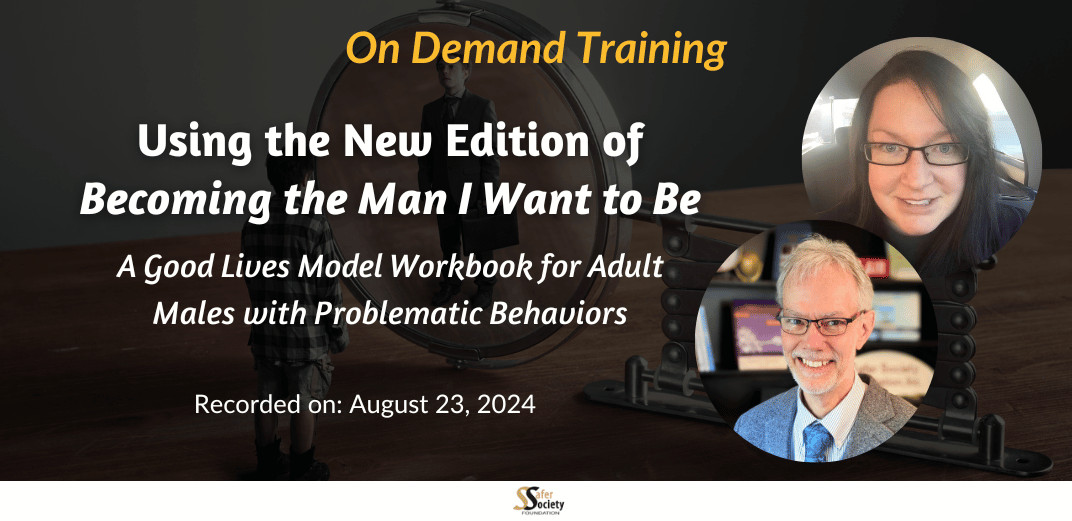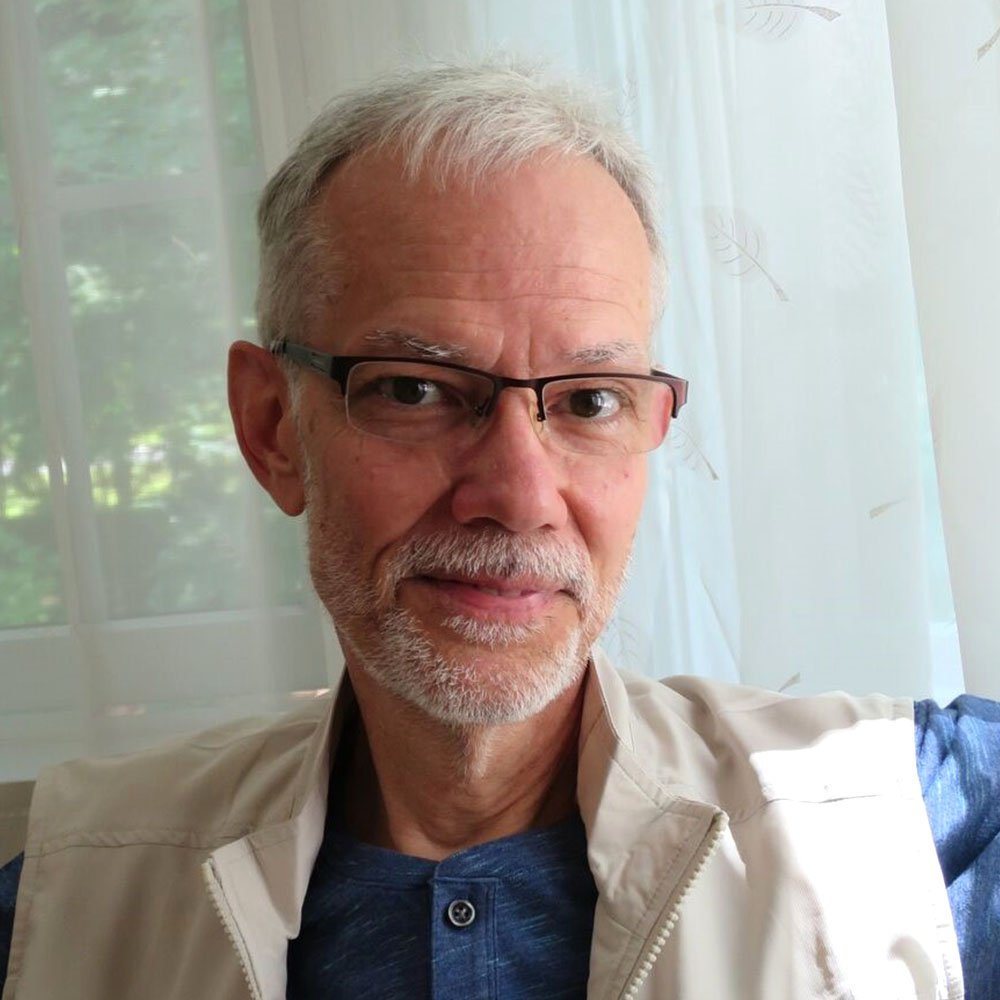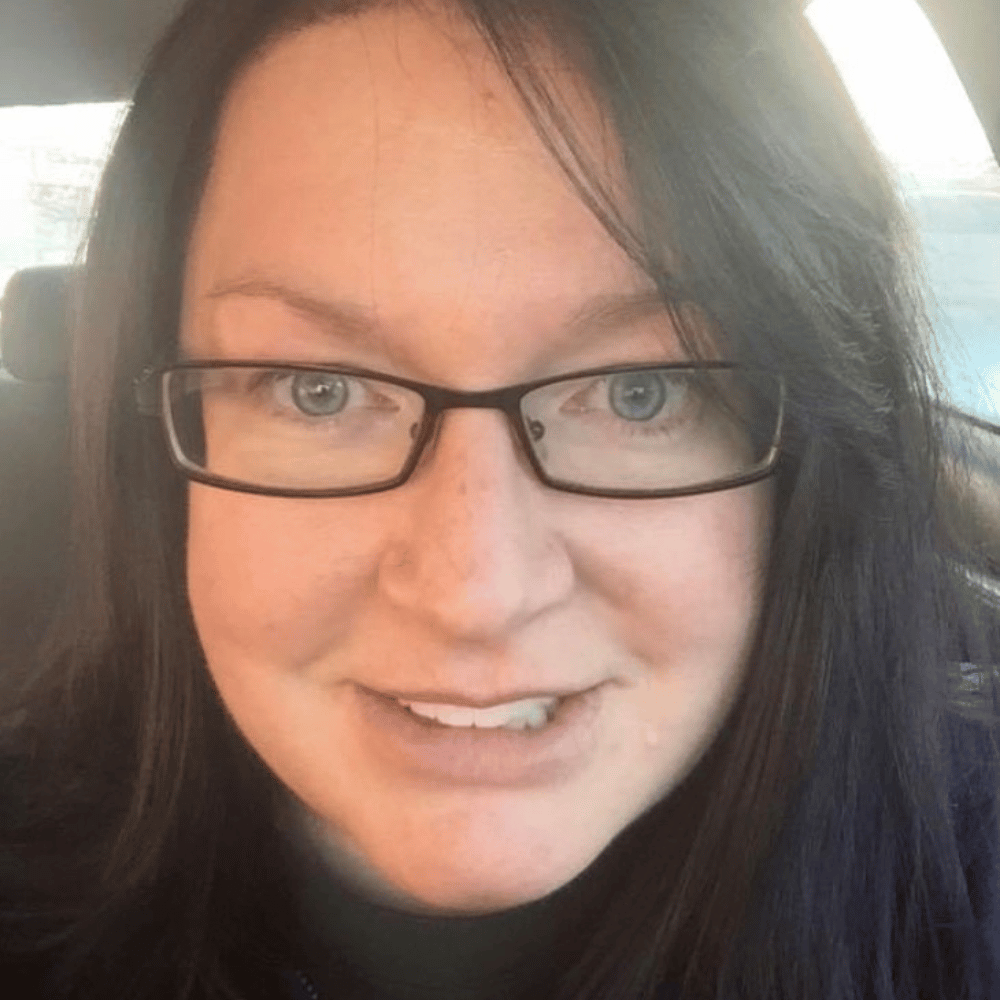
Using the New Edition of Becoming the Man I Want to Be: A Good Lives Model Workbook for Adult Males with Problematic Behaviors
Already purchased an On Demand training?
Click here to access your Safer Society On-Demand Training Center account.
Using the Good Lives Model, the Becoming the Man I Want to Be workbook was written to be engaging for clients whose adverse childhood experiences and problem behaviors have caused them to fall behind academically, socially, and interpersonally throughout their lives. The workbook takes the more complicated elements of the GLM and operationalize them for treatment settings. The expanded second edition aims to enhance the workbook’s effectiveness in helping clients develop healthier lifestyles and behaviors.
Training Takeaways
 After attending this training, participants will better understand how to use the workbook in treatment. The training begins by reviewing the core principles of the GLM and then offers ideas for how clinicians and counselors can use each section of the workbook—in particular, the chapters that are new to the second edition. Central to this training is its focus on dovetailing the GLM and the workbook with Motivational Interviewing skills and the principles of Trauma-Informed Care.
After attending this training, participants will better understand how to use the workbook in treatment. The training begins by reviewing the core principles of the GLM and then offers ideas for how clinicians and counselors can use each section of the workbook—in particular, the chapters that are new to the second edition. Central to this training is its focus on dovetailing the GLM and the workbook with Motivational Interviewing skills and the principles of Trauma-Informed Care.
The GLM is a strengths-based rehabilitation practice framework that augments the risk, need, and responsivity principles of effective correctional intervention by assisting clients to develop and implement meaningful life plans that are incompatible with future offending.
Key topics discussed during this training:
- Core Principles of the Good Lives Model
- The role of the therapist in using Becoming the Man I Want to Be
- Applications of Becoming the Man I Want to Be in group and individual treatment
- Translating the GLM’s ten “Primary human goods” into the eight “good life goals” of the workbook
- Addressing clients’ past, present, and future obstacles to meeting their good life goals
- Examination of family involvement and how the etiology of harmful behaviors often results from developmental adversity and challenges in attaining specific goals that are common to all human beings.
Safer Society Press also publishes Becoming the Woman I Want to Be: A Good Lives Model Workbook for Women. Note that we recognize the dramatically different roles that gender identity plays in clients’ lives. As a result, we recommend that each professional, in consultation with their individual clients, determine which workbook is a better fit for a given person.
1) Describe how to work with the “good life goals” in Becoming the Man I Want to Be.
2) Explain how to work with the “good life goals” that are implicated in harmful behavior.
3) Describe four obstacles to achieving one’s “good life goals.”
Audience
This training is intended for professionals working with adults exhibiting problematic behaviors who seek to incorporate the Becoming the Man I Want to Be workbook while integrating the principles of the Good Lives Model (GLM) with Motivational Interviewing techniques and Trauma-Informed Care into treatment settings.
Content Level
Who's Presenting

David Prescott, LICSW, ATSA-F
A mental health practitioner of 40 years, David Prescott is the Director of the Safer Society Continuing Education Center. He is the author and editor of 25 books in the areas of understanding and improving services to at-risk clients. He is best known for his work in the areas of understanding, assessing, and treating sexual violence and trauma. Mr. Prescott is the recipient of the 2014 Distinguished Contribution award from the Association for the Treatment and Prevention of Sexual Abuse (ATSA), the 2018 recipient of the National Adolescent Perpetration Network’s C. Henry Kempe Lifetime Achievement award, and the 2022 recipient of the Fay Honey Knopp Award from the New York State Alliance for the Prevention of Sexual Abuse and New York State ATSA. He also served as ATSA President in 2008-09. Mr. Prescott currently trains and lectures around the world. His published work has been translated into Japanese, Korean, German, French, Polish, and Southern Tutchone. He has served on the editorial boards of four scholarly journals.

Dawn Pflugradt, PsyD, LP, LCSW
Dawn M. Pflugradt, Psy.D., is a licensed psychologist (Iowa and Wisconsin) and licensed clinical social worker (Wisconsin) specializing in forensic, correctional, and clinical psychology. She holds advanced degrees in clinical bioethics, clinical psychology, and social work. Dr. Pflugradt has been qualified as an expert witness in multiple jurisdictions. Dr. Pflugradt works as a risk assessment specialist and sexually violent person evaluator for a midwestern Department of Corrections, maintains a private forensic psychology practice, and holds an appointment as professor of psychology at the Wisconsin School of Professional Psychology. She also serves on the scientific advisory board for the International Association for the Treatment of Sexual Offenders (IATSO), is an ATSA Fellow, and a SAARNA certified STATIC-99R, STABLE-2007, ACUTE-2007 and ODARA trainer.
In addition to her years of clinical experience, Dr. Pflugradt has published numerous articles, practice guidelines, books, and book chapters in the areas of developmental neuropsychology and criminology, the latter focusing on individuals who commit sexual and violent crimes.
